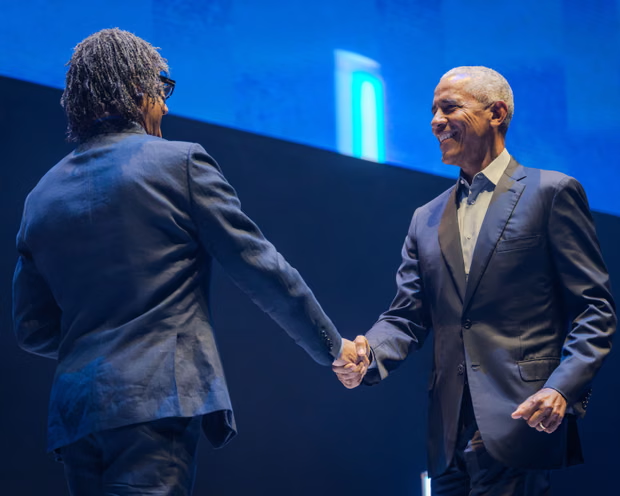Former U.S. president Barack Obama has warned that the United States is caught between two competing visions of its future. Speaking in London, Obama described the situation as a “tug of war” between progressives who believe in steady democratic change and populists, including Donald Trump, who favor a return to a more conservative vision of America.
Obama told the audience that his successor, Trump, has been clear about his desire to revive an older idea of the country. In this worldview, he argued, the phrase “we, the people” does not apply to everyone but only to select groups. Obama also said such thinking reinforces hierarchies of status and power that divide communities and weaken equality.
The remarks highlight how Trump and Obama continue to symbolize two very different paths for the United States. While Trump pushes a conservative populist vision focused on nationalism and tradition, Obama emphasized democratic values, diversity, and inclusion.
Obama did not limit his criticism to Trump and conservative populists. He also addressed what he sees as weaknesses within progressive politics. According to him, many progressives became “smug” and “complacent” in the 1990s and 2000s. He explained that progressives often assumed their values were secure and widely accepted, failing to prepare for the moment when those values would be tested. Now, he argued, those very principles are being challenged in ways that demand stronger defense.
His words reflect a broader concern that U.S. democracy faces serious pressure from both complacency and reactionary movements. Obama stressed that progress is never automatic and must be constantly defended. He reminded the audience that democratic change is slow, requires patience, and must be reinforced by active citizen involvement.
For Obama, the risk is that progressives who take achievements for granted weaken the fight for equality, while populists exploit discontent and fear to push back against social and cultural change. He framed this as an ongoing battle for the identity of the nation.
The contrast between Obama’s vision and Trump’s approach remains sharp. Trump has repeatedly called for a return to traditional values, often emphasizing national strength, strict immigration policies, and skepticism toward international institutions. Obama, meanwhile, has consistently spoken about inclusion, cooperation, and the need to broaden the idea of who belongs in the American community.
Obama’s comments in London also highlight how U.S. debates resonate internationally. Global audiences often look to the United States as a model of democracy, and internal divisions raise questions about the stability of its political system. By speaking abroad, Obama not only criticized U.S. politics but also warned allies about the challenges facing democratic societies worldwide.
Observers note that Obama’s willingness to confront both progressives and conservatives is part of his style of leadership. He often urges balance, reminding audiences that democratic progress requires vigilance and humility. His remarks also suggest that progressives cannot afford to assume that their values will remain dominant without effort.
The political divide between Obama and Trump has long shaped U.S. discourse. Obama’s presidency represented a push for social progress, healthcare reform, and international cooperation. Trump’s presidency, in contrast, was marked by a focus on nationalism, deregulation, and skepticism of long-standing institutions. The two leaders continue to embody these opposing forces even after leaving office.
As the United States heads into future elections, these competing visions are likely to remain central. The debate over America’s direction involves not only policies but also the very definition of citizenship, inclusion, and national identity. Obama’s comments underline how the struggle between progress and conservatism remains unresolved and deeply influential.
In his closing message, Obama urged citizens to recognize the stakes of the current moment. He said that values like equality, fairness, and justice must not be treated as permanent victories but as commitments that require ongoing defense. For him, the challenge is not only resisting conservative populism but also avoiding complacency within progressive movements.
The clash between Obama and Trump, as symbols of these two visions, reflects a broader struggle shaping America’s future. Whether the U.S. leans toward inclusive democracy or conservative populism will depend on the choices its people make in the years ahead.







